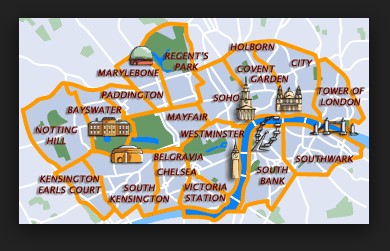
Iniciación al inglés – Repaso de conceptos para conversaciones básicas
Nombre
En inglés puede usarse las palabra “name” para hablar del nombre de pila, del apellido o del nombre completo. En los formularios se distingue entre:
First name: nombre de pila y surname: apellido.
Dirección
Por lo general no se traduce, se dice tal cual. El orden utilizado en inglés es al revés que en español:
Número
Nombre de la calle, avenida…
La palabra: calle, plaza, avenida…
Ejemplo. My address is 4, Sun Street.
Teléfono
El número del teléfono en inglés se da cifra a cifra. Cuando una de ellas se repite, se usa la palabra “double” (doble).
Los números en Inglaterra, generalmente, tienen siete cifras. Después de decir la tercera, se hace una pequeña pausa.
Por ejemplo: My telephone number’s 3054778
three – zero – five // four – double seven – eight.
Edad
La pregunta “How old … …?” no puede traducirse literalmente, hay que memorizarla, lo mismo que la respuesta: I’m …, you’re … Recuerda siempre que para hablar de la edad se usa el verbo To Be, que significa ser o estar, seguido del número de años.
Years old se mantiene sólo cuando se habla de cosas, aunque también se puede usar con personas.
Países y nacionalidades
Los adjetivos de nacionalidad se escriben con mayúscula.
La pregunta Where are you from? Significa: ¿De dónde eres?
Profesiones
Para preguntar a qué se dedica nuestro interlocutor, generalmente usamos: What do you do? También podemos ver en formularios: What’s your occupation? En la respuesta, si hablamos en singular, la profesión va precedida del artículo indeterminado “A”.
Formación del plural
El plural de los nombres se forma, generalmente, añadiendo una “s” al singular.
Artículos
Indeterminado: A = un, una. Sólo puede usarse en singular.
Determinado: The, sirve para el masculino, femenino, singular y plural: el, la, los, las.
Adjetivos
Calificativos: no tienen género ni número, son invariables. Cuando acompañan al nombre van siempre delante de él. Esto ocurre también con los colores. Ejemplo: El mar azul – The blue sea. Los teléfonos rojos – The red telephones.
Posesivos: Hay que tener cuidado con “su”
- Su (de usted/es) = your
- Su (de él) = his
- Su (de ella) = her
- Su (de un animal o cosa) = Its
- Su (de ellos) = their
En inglés concuerdan siempre con el poseedor.
Numerales
1 – One
2 – Two
3 – Three
4 – Four
5 – Five
6 – Six
7 – Seven
8 – Eight
9 – Nine
10 – Ten
11 – Eleven
12 – Twelve
13 – Thirteen
14 – Fourteen
15 – Fifteen
16 – Sixteen
17 – Seventeen
18 – Eighteen
19 – Nineteen
20 – Twenty
30 – Thirty
40 –Forty
50- Fifty
60 – Sixty
70 – Seventy
80 – Eighty
90 – Ninety
Demostrativos
Son los adjetivos que tienen plural en inglés. Se usan también como pronombres e indican, como en español, cercanía o lejanía respecto de la persona que habla.
Ejemplo en singular: This = éste, ésta, esto – That = ése, ésa, eso, aquél, aquella, aquello.
Verbos
Presente de To Be.
El verbo To Be = ser/estar, tiene en presente tres formas distintas: Am, is, are y se usa en español con diferentes significados. Está dentro de los llamados verbos “especiales”:
Las negaciones se forman añadiendo Not al verbo.
Las preguntas se forman invirtiendo el orden normal de la frase:
Verbo + sujeto + los complementos. El signo de interrogación sólo va al final.
Presente
I am – yo soy/estoy
You are – tú eres/estás, usted es/está
He/she is – él es/está, ella es/está
It is – eso es/está
We are – nosotros/as somos/estamos
You are – ustedes son/están, vosotros/as sois/estáis
They are – ellos/as son/están
Forma contraída
Respuesta afirmativa
I'm
You're
He's
She's
It's
We're
You're
They're
Respuesta negativa
I'm not
You aren’t
He isn’t
She isn’t
It isn’t
We aren’t
You aren’t
They aren’t
Forma interrogativa
Am I …?
Are you …?
Is he …?
Is she …?
Are we …?
Are you …?
Are they …?
En la conversación se usa siempre la forma contraída.
Respuesta breve: Se forma con Yes o No, el sujeto siempre en forma de pronombre y el verbo. La respuesta breve afirmativa no se puede contraer; la negativa, sí. Ejemplos: Yes, I am; No, I’m not.








